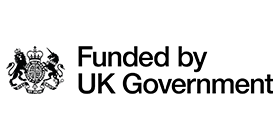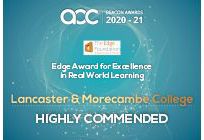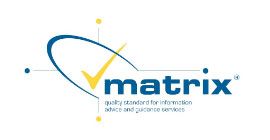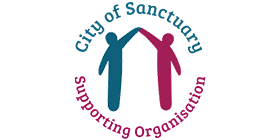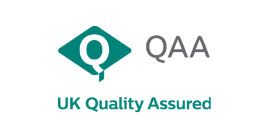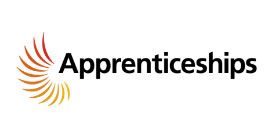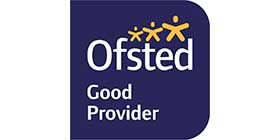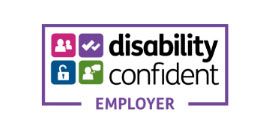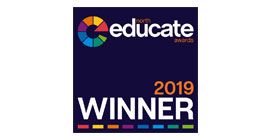For online payments please call our Finance Team on 01524 521321
Past International Research Projects
LAPIS: LEARNING FOR ADULT SOCIAL CARE PRACTICE INNOVATIONS AND SKILLS DEVELOPMENT

LAPIS: LEARNING FOR ADULT SOCIAL CARE PRACTICE INNOVATIONS AND SKILLS DEVELOPMENT
1st Sept 2021 - 31st August 2023
The LAPIS project aims to increase opportunities for effective work-based learning and recognition of informal learning for better adult social care practice, and to support innovation and skills development in the adult social care sector. The project will bring together a set of European and UK based partners, from across the Education, Digital Technology and Care sectors, over a three-year period, and we are funded by Erasmus+. The needs addressed by this project were identified in the previous Erasmus + Project 'Helpcare' (www.helpcare-project.org) completed in 2018.
STEAMITUP - PREPARING TEACHERS AND STUDENTS FOR A DIGITAL WORLD

STEAMITUP - PREPARING TEACHERS AND STUDENTS FOR A DIGITAL WORLD
1st Nov 2019 - 31st Jan 2022
KA201 School project funded by the UK national agency. Working with partners in Cyprus, Ireland, Greece, Spain and Netherlands
EDU-VET - E-LEARNING DIGITISATION AND UNITS FOR LEARNING AT VET SCHOOLS

EDU-VET - E-LEARNING DIGITISATION AND UNITS FOR LEARNING AT VET SCHOOLS – CREATING ONLINE LEARNING ENVIRONMENTS IN TECHNICAL EDUCATION FOR EUROPEAN METAL INDUSTRY
1st Sept 2019 - 31st March 2022
eduproject.eu/eduvet/index.php/en/
KA202 VET project funded by the German national agency. Working with partners in Germany, Spain and Netherlands.
APPHOP - RANDOMISING ENTREPRENEURSHIP TRAINING THROUGH BREAKOUT CHALLENGES ON SMARTPHONES

APPHOP - RANDOMISING ENTREPRENEURSHIP TRAINING THROUGH BREAKOUT CHALLENGES ON SMARTPHONES
1st Sept 2019 - 30th Sept 2021
KA202 VET project funded by the UK national agency. Working with partners in Ireland, Bulgaria, Greece, Cyprus, Spain, Poland and Portugal
GAME-CHANGER - BUILDING ENTREPRENEURIAL COMPETENCES THROUGH CHALLENGE-BASED LEARNING

GAME-CHANGER - BUILDING ENTREPRENEURIAL COMPETENCES THROUGH CHALLENGE-BASED LEARNING
1st Sept 2019 - 31 Aug 2021
gamechanger-project.eu/
KA205 Youth project funded by the UK national agency. Working with partners in Ireland, Cyprus, Germany and Poland
FAMILY CIRCLE - FAMILY LEARNING TO DRIVE DEMAND FOR A CIRCULAR ECONOMY
FAMILY CIRCLE - FAMILY LEARNING TO DRIVE DEMAND FOR A CIRCULAR ECONOMY
1st Sept 2019 - 31st March 2022
familycircleproject.eu/en/
KA204 Adult project funded by the Swedish national agency. Working with partners in Sweden, Ireland, Portugal, Cyprus, Poland, Hungary and Bulgaria.
ENTRE@VETSCHOOLS

ENTRE@VETSCHOOLS
Erasmus+ KA2 Strategic Partnership VET 2018 - 2021
entrevet.eu/ www.facebook.com/EntreVET/
PROMOTING ENTREPRENEURSHIP THROUGH AN INTEGRATED CAREER ORIENTATION PROGRAMME AND FLEXIBLE LEARNING PATHWAYS FOR VET STUDENTS
The transition from school into professional life is one of the most challenging moments in life. A competitive job market requires young people to, not only possess a relevant qualification but also the ability to apply their skills in the workplace, to be adaptive, and to act in an entrepreneurial way.
Developing a career is a process, not just a destination. Unfortunately, not enough attention is paid to the developmental process required to engage in thoughtful, thorough career development. We will design, implement and evaluate a CAREER GUIDANCE EDUCATIONAL TOOL KIT to support CAREER ADVISORS to strengthen their profiles and in doing so to upgrade their methods and practices for better career orientation towards entrepreneurial competences for VET students.
ENTRE@VETSCHOOLS is an Erasmus+ KA2 VET projects with partners from Leibniz University in Hanover, Germany, 2 EK Peiraia School in Piraeus, Greece, Fundatia CDIMM Maramures in Baia Mare, Romania, A & A Emphasys Interactive Solutions Ltd Nicosia, Cyprus, Reykjavik University, Iceland and Lancaster and Morecambe College in the UK.
DIGITAL@YOUTH WORK

DIGITAL@YOUTH WORK
Erasmus+ KA2 Strategic Partnership for YOUTH 2019 - 2021
digital-youth.work/
The digital age is expanding into all areas of our lives, and it is not just those working in IT that will need to be ready for the digital transformation. “The digital skills gap is real. While 90% of future jobs require some level of digital literacy, 44% of Europeans lack basic digital skills” (quote from Mariya Gabriel, the current European Commissioner for Digital Economy and Society).
The digitalization of the economy is one of the most important drivers behind the profound transformation of the labour market. An increased demand of digital skills which is expected to still grow will be must be balanced. The digitalization which demands digital skills as future transversal skills is happening right now and will change the work requirements and will challenge everybody.
Given the recognized importance of digital skills for an effective implementation of ICT in the workplace, the main challenge for employers is to make sure that the supply of digital skills within the workforce matches its demand at the labour market and enterprise level, in terms of both required type and level of skills.
Effective youth work and non-formal education can help young people to empower themselves and encourage their active participation in society. It equips them with skills, competences and experiences for life, thereby maximizing the protective factors which enhance the development, well-being, autonomy and e-inclusion of all young people, including those with fewer opportunities.
The partners from Germany (2), Cyprus, Spain, UK & Italy will aim to upgrade youth work and skills, but also to ensure social inclusion, access and participation, through the design, development and evaluation of a Complete Tool Kit and Educational Pack for developing, implementing and monitoring digital strategies in Youth Work. We also aim to research and share ‘deep-tech’ skills such as coding, robotics, ecommerce, web, graphic and media design, targeted to the needs of the labour market for specific job digital profiles while providing Career Orientation opportunities - to open up new routes for linking youth work with education and Training.
UNWIND: REDUCING WORKPLACE STRESS FOR YOUNG PEOPLE BY BUILDING CAREER MANAGEMENT SKILLS

MANAGEMENT SKILLS
Erasmus+ KA2 Strategic Partnership Youth 2018 - 2020
unwind.work/cz/home/ www.facebook.com/unwind.work/
WHAT IS UNWIND?
The overall objective of the Erasmus+ UNWIND project is to provide young people, both in employment or seeking employment, with accessible opportunities to build the necessary skills to cope with, and manage work-related stress and to build sustainable careers in today’s dynamic and challenging economy.
UNWIND will develop a suite of innovative online resources that support young people to develop important transversal skills for their own career management, job retention and stress management. The resources will support the achievement of a significant immediate and ongoing skills upgrade within the direct partnership and the wider European labour force.
NEET SYSTEM: ONLINE EDUCATIONAL ESCAPE ROOMS TO RE-ENGAGE ESLS AND NEETS

NEET SYSTEM: ONLINE EDUCATIONAL ESCAPE ROOMS TO RE-ENGAGE ESLS AND NEETS
Erasmus+ KA2 Strategic Partnership Adult Education 2018 - 2020
neet-system.eu/ www.facebook.com/NEET-System-Project-257532031614821/
WHAT IS NEET-SYSTEM?
The primary objective of the Erasmus+ KA2 project is to design and develop a bespoke challenge-based educational intervention aimed at re- engaging NEETs (young people who are Not in Education, Employment, or Training) and supporting them to build skills and competences to assist their reintegration to education or employment.
Partners will initially focus on building trust and confidence which may have been broken by past negative experiences and on addressing motivational deficits that act as barriers to engagement. Once NEETs are re-engaged the online escape room challenges will focus on the development of market oriented key competences.
For the adult education professionals who will ultimately be charged with delivering and sustaining this new intervention partners are proposing a comprehensive in-service training programme to support them in using these new resources but also developing key skills to enable them create new challenges in the future.
CT+: CREATIVITY TRAINING FOR EUROPE

CT+: CREATIVITY TRAINING FOR EUROPE
Erasmus+ KA2 Strategic Partnership Adult Education 2018 - 2020
creativitytrainingproject.netsons.org/
Creativity Training for Europe (CT +) is a project with the objective to promote the development of relevant and high-quality skills and competences, such as creativity and innovation linked to entrepreneurship, while taking care of the differences in gender promoting the inclusion of women in creative and entrepreneurial sectors.
Training plays an important role in promoting more entrepreneurial attitudes and behaviours, since it not only helps to achieve concrete entrepreneurial activity due to lack of entrepreneurial competences and support could often lead a new business to failure, but also enhances the employability of people, and especially project target groups which are adult people low-skilled or low-qualified but with a high creativity potential.
The project will prioritize unemployed people, from target groups, to provide them with necessary competences and skills, information and support on self-employment and business creation in order to encourage them to consider self-employment as a feasible alternative and provide them the opportunity to start a project.
HEALTHY MINDS WELLBEING AT SCHOOL

HEALTHY MINDS WELLBEING AT SCHOOL
Erasmus+ KA2 Strategic Partnership for Schools 2018-2021
In recent years the mental health of our young people has become a major issue, with a noticeable marked rise in within schools resulting in an adverse effect within the educational system. We have seen an increase in learners with diagnosed issues such as anxiety disorders and behavioural difficulties which require additional support within the classroom. Counselling services have seen an increase in the number of students self-harming or using drugs and alcohol as a coping mechanism.
Many students also face issues linked to family breakdown, caring responsibilities and poverty. The rapid growth and importance of social media in young people’s lives has also had an adverse effect related to young people’s identity, sexuality, self-worth and body image.
We see this project as a primary opportunity to promote the acquisition of new skills engaging staff and students at all levels of the design and implementation of the project. And with a focus on ICT technologies we believe that engagement will be driven by their preference to operate in a digitally current environment.
The project partners from UK (2), Sweden, Romania, Bulgaria, Italy (Sardinia) Lithuania & Portugal will develop, test & disseminate a modular curriculum and training course, & support materials which will be delivered flexibly in a broad range of educational settings. The course will highlight a broad range of issues that our research has highlighted to be problematic for students. During the training each issue will be discussed, myths will be dispelled & students will be reassured by the experience of teachers and tutors. Students will have many opportunities to be actively involved in developing the messages & passing them on to their peers.
HYPER

HYPER
Erasmus+ KA2 Strategic Partnership YOUTH 2019-2021
hyper-project.eu/
HYPER is a 2-year Erasmus+ KA2 Youth Project that intends to contribute to the ongoing threat of violent extremism in Europe by developing an understanding and responses to the youth radicalization processes and approaches that feed it. The project will work towards the design and production of a full suite of educational resources that show the process of radicalization in action. These resources will focus on demonstrating how radicalisation can happen on the most popular digital and social media platforms where today’s young people hang out and where many are at their most vulnerable.
To accompany these simulation resources the project consortium will develop a peer training programme for young people interested in being credible voices against radical extremist rhetoric and actions. To support these youth professionals HYPER will develop bespoke in-service and induction training programmes to enable them to extract the maximum benefit from the full range of proposed tools. Partners are from Cyprus, Germany, UK, Ireland, Czech Republic and France.
APT: APPRENTICE PREPARATION TRAINING - NEW APPROACHES IN MANAGING THE TRANSITION FROM EDUCATION TO EMPLOYMENT
APT: APPRENTICE PREPARATION TRAINING - NEW APPROACHES IN MANAGING THE TRANSITION FROM EDUCATION TO EMPLOYMENT
Erasmus+ KA2 Strategic Partnership VET / Cross Sector Education: 2016-2019
www.aptproject.eu Facebook group - www.facebook.com/ErasmusplusAPTProject Twitter: @apt_ka2
Across the EU, we recognise that the health, sustainability and competitive edge of our economies depends on our young people entering and retaining meaningful employment and getting the appropriate skills to adapt to the new demands of the labour market. This 30 month project seeks to address the new challenges in the labour market by exploring all the contributory factors & developing practical, user friendly and transferable solutions by nurturing & capitalising on the good work already happening in the partner countries and across Europe.
The target group in this project are organisations and employers that work directly with young people, who are facing significant challenges securing meaningful careers, as well as the young people themselves who often need extra guidance when making the transition from education to the world of work. To support this notion and develop new approaches to handling this transition process are the main objectives of the training elements in this project and also why we are also seeking employer, SME and other professional voices.
Led by LMC, the partnership is made up of 7 partner countries: UK, Italy, Cyprus, Spain, Poland, Romania, and Lithuania, APT is a 30 month project.
By gaining a unique level of access to young people who in the process of transition from education to work, we hope to get about the state of the art pertaining to career guidance, whilst working together to develop new approaches matching the ever changing nature of the job market to the vocational skills of those entering work.
The outputs will be a suite of modular resources, testing tools and a training package for use in training situations with career guides and trainers, targeting upwards of 200 young people. Materials will be adapted by partners to fit different sectors and educational levels and we hope to run several events to maximise the interest in the final tools and share them with local, regional and international organisations.
QUALISHIP
QUALISHIP
Erasmus+ KA2 Strategic Partnership VET 2017-2019
This 2 Year project will exchange best practice across the consortium partners (Spain, Austria, Italy & UK) when placing students into internships and work placements as part of their vocational course.
Each country will compare models of competence and other instruments that aim to evaluate and validate skills gained in the workplace. There is a focus on the soft skills and personal competencies in the project and how these can be adapted and adopted across the partnership to contribute to an improved internship system and tools to benefit each partner.
EPODS: ONLINE PROFESSIONAL DEVELOPMENT IN SECOND CHANCE EDUCATION
EPODS: ONLINE PROFESSIONAL DEVELOPMENT IN SECOND CHANCE EDUCATION
Erasmus+ KA2 Strategic Partnership Adult Education: 2016-2019
www.secondchanceeducation.eu Facebook - www.facebook.com/secondchanceeducation Twitter: @2ndChanceEdu
Opportunities and demands of globalisation and technology are fuelling transformations of educational practices and infrastructure rapidly. The evolution of educational systems and digital technologies also provide additional challenges to framing our perspectives, including the emergence of virtual and networked schools that share courses and programmes. Utilising these technological advancements to support good-quality training and reflective professional development are fast becoming an essential part of a teacher’s professional life. And it is argued that supporting teachers in their professional development leads to improved outcomes for teachers, trainers and learners alike.
ePODS focus is mainly on the elements of resources and training in the platform www.secondchanceeducation.eu These two elements will be further developed for teachers/trainers working in second chance education.
ePODS will be further be focussed on two objectives: • To promote European integration of professional development of teachers/trainers in second chance education
To set up an organic / growing database connecting tools, schools, teachers/trainers and beneficiaries
ePODS will be a Europe wide sustainable offer for teachers/trainers in second chance education and go on to deliver the following:
Development of a European professional development service.
Vitalise the online teacher/trainer community via providing e-content for teacher/trainers and webinars.
Development of at least 10 e-learning courses for the current professional development offers on secondeducation.eu.
Development of a tool to create your own e-learning course
The partnership is made up of 8 partners across 6 partner countries: Netherlands, Cyprus, UK, Italy, Greece and Germany. Each partner will work with local associate partners and schools to share the developed materials and participate in the training events, piloting and conferences in the partner countries. In the UK we are working with Bowerham School, Morecambe High, Lancaster University and other associate organisations that are part of the national NCOP and CCOP initiatives.
T4TEMP: TOOLS 4 TRAINERS TO EMPOWER NEETS
T4TEMP: TOOLS 4 TRAINERS TO EMPOWER NEETS
Erasmus+ KA2 Strategic Partnership Adult Education: 2016-2018
T4TEMP will create a new tool, namely the E-Learning Toolkit which will address educators, career guidance staff, youth workers and those who deal with NEET young people (Not in Education, Employment, or Training) to improve their competence in effective engagement methodologies.
T4TEMP aims to increase participation of NEET young people and help them into the labour market with a secondary aim, to raise awareness of heterogeneity of the NEET population across EU member states to address the root causes and offer solutions.
The partnership is made up of 6 partner countries: Estonia, Italy, Cyprus, Spain, Greece and the UK.
The project will implement the following objectives:
- Identify, by international comparison a State of the Art for Adult educators who work with the main target group.
- Develop an online e-Learning Toolkit. Training tools that enable educators allocate their time with the target group in a more constructive and effective way.
- Develop and implement targeted courses, to enable professional users to understand, support and increase their skills in order to be effective in supporting NEETs.
Throughout the implementation and validation phase of the project activities the partners will include members of the target group in training sessions, local national events, peer feedback etc.) Furthermore it is envisaged that other people across other sectors such as, trade unions, those who provide in-service training and development for teachers and young professionals, will also benefit from the tools developed.
COMTRAIN: COMPUTER SERVICE TRAINING FOR PERSONAL AND PROFESSIONAL DEVELOPMENT
COMTRAIN: COMPUTER SERVICE TRAINING FOR PERSONAL AND PROFESSIONAL DEVELOPMENT
Erasmus+ KA2 Strategic Partnership Adult Education: 2016-2018
www.comtrainproject.eu
Made up of 6 partners from 5 countries, this project targets Adults (in particular aged 50+) who lack the skills in the field of ICT and IT. We will capitalise on existing training courses related to ICT use that are designed to reduce the digital gap, dividing older and younger generations. The majority of these courses aim to provide Adults with the technical skills connected with computer use and operating basic programs and with some additional input they can increase the longer term prospects of the target group of adults.
Older adults (50+) belong to an increasing demographic group facing difficult situations accessing the labour market, and since the economic crisis of 2008 many people in the target group have lost their jobs, facing unemployed with a reduced prospect of meaningful careers. Adults, in particular those who are struggling with re-employment are also at risk of further social exclusion and isolation because of the situation. CST materials will be created in order to support adults in Social and Professional Development through targeted Computer Service Training.
Partners will exchange experiences and best practices in the implementation of Computer Service Training courses and share the task of the common creation of training which not only the supports ICT, but also use look at new ways to use it for social and personal development.
Training workshops and events will take place throughout 2018 in all partner countries.
RESPECT4 – EDUCATION WITHOUT BARRIERS
RESPECT4 – EDUCATION WITHOUT BARRIERS
Erasmus+ KA2 Schools Strategic Partnership: 2015-2018
www.respect4.me Twitter: @respect4eu
This 3 year project is inspired by a motivation to provide a positive image of the European Union in response to negative attitudes emerging in the media and from some areas of the political spectrum.
The guiding principle is to challenge the misconception that citizenship within Europe threatens our sense of national identity, hence confronting negative perceptions of Europe often advocated in the media and to offer an alternative to an isolationist paradigm of nationhood. The project will use the notion of respect as a vehicle to compare, contrast, highlight and educate participants to challenging concepts in education across borders.
OUR MAIN RESPECT4 OBJECTIVES ARE:
- To provide students & teachers from schools located in 8 countries (UK, Romania, Greece, France, Belgium, Hungary, Norway & Italy) with an enriching cross curricular project which develops their European awareness and promotes a sense of respect, self, European identity and to challenge and overcome negative perceptions regarding European citizenship.
- To broaden learners' and teachers’ horizons relating to cultural knowledge, language skills and intercultural dialogue.
- To motivate the use of ICT-based content, contributing to ICT skills acquisition and innovatory teaching methods to benefit staff and learners.
- To promote teamwork amongst staff and learners in the different partner countries and between different sections of our own communities and organisations, thus developing participants’ organisational/ leadership & conflict management skills and applying these skills to the workplace and daily life.
- To compare different educational systems in order to transfer best practice and inform students of different possibilities of acquiring further education and undertaking mobility abroad.
JOBTROTTER
JOBTROTTER
Erasmus+ KA2 Schools Strategic Partnership: 2015-2018
This 3 year project will mainly involve students up to the age of 18. The main theme and focus of the project is based around Work and Mobility across Europe. It is the aim of the project to promote the concept of free mobility of labour for young people across Europe, regions and across borders. The project will consider the different historical and cultural approaches to work across the countries involved in the project such as; what is a good job? What are the main types of employment in your region? What are the current and future jobs? There is a focus on students exchanges in each of the partner countries; Germany, UK, Spain, Bulgaria, Turkey & Italy.
A programme of fun and engaging activities will be designed in staff meetings and then used during the student exchanges that will bring students together to share their experiences and knowledge of employment and how to access the labour market. There is also an ongoing emphasis on creativity and competition throughout the project lifetime.
HELPCARE: PATHWAYS TO THE FUTURE FOR HEALTH AND SOCIAL CARE
HELPCARE: PATHWAYS TO THE FUTURE FOR HEALTH AND SOCIAL CARE
Erasmus+ KA2 Strategic Partnership – Cross Sectoral with a focus on VET: 2014-2017
www.helpcare-project.org Twitter: @helpcareproject
The ‘care gap’ is the difference between the need for health and social care for older people & the capacity to provide that care through family, friends or professional carers. HelpCare proposes to help close the care gap via better management of the education and training of care workers to develop a more professional workforce that will attract recruits and has recognised progression pathways.
The problem:
- The EU population is aging rapidly
- Many care workers are engaged in the informal economy
- Health & social care workers in the formal economy find it very difficult to access training and development opportunities;
- Qualifications for care workers are not a pre-requisite for employment & there are no agreed education and training standards across the EU for this sort of work.
- Health and Social Care work is seen as undesirable and low status with no recognised routes for progression into wider caring professions and with no HE-based training available in this specialist area for managers/leaders of care provision.
The overall aim of HelpCare is to develop and transfer innovative practices in education for the qualification and professionalization of health and social care workers as well as encourage people to view health and social care work as a positive career choice with recognized routes for progression through VET and from VET to HE.
Led by Lancaster University, the project has partners from UK, Poland, Bulgaria, Italy and Greece.
IDEAS INTO ACTION - ENTREPRENEURSHIP FOR YOUTH WORKERS BASED ON LOCAL ECONOMY NEEDS
IDEAS INTO ACTION - ENTREPRENEURSHIP FOR YOUTH WORKERS BASED ON LOCAL ECONOMY NEEDS
Erasmus+ KA2 Strategic Partnership for Youth: 2014-2017
Twitter: @iiaproject
LMC led, and involving partners from Italy, Lithuania, Romania, Slovakia, Netherlands and a local Community Interest Company; this Youth focussed Erasmus+ project will research and develop materials to help train young people and youth leaders to develop their entrepreneurial skills.
The business focus will relate to the partners’ local needs and over the two years of the project offer a range of solutions and activities to engage young people in the local economy needs.
It will include research modules on entrepreneurship in education, the local economy and contributions from local social partners who work with young people. The project will then develop and pilot a package for Youth and leadership skills training to support young people who want to get on in life and business.
The project also aims to develop the ‘mind-set’ and skills necessary for young people to be entrepreneurial. The final outcome will be a free to use, easily accessible training package aimed at youth workers and young people.
DIGITAL TIMELINES
DIGITAL TIMELINES
Erasmus+ KA2 Strategic Partnership for Adult Education: 2014-2016
www.digitaltimelines.eu Twitter: @digitimelines
European Projects prior to 2014
START- ART OF THE START
Grundtvig Partnership 2013- 2015
ECAPSE - EARLY CO-ORDINATED ACTIONS PREVENTING SOCIAL EXCLUSION
Leonardo Transfer of Innovation: 2013-2015
FESTEVET LEONARDO PARTNERSHIP PROJECT: 2012 - 2014
WOWSA – WHAT'S ON THE WEB SAFELY FOR ADULTS PROJECT: 2012 - 2014
FACETOFACE LEONARDO PARTNERSHIP PROJECT: 2010 - 2012
This 2 year project funded by the Leonardo stream of the Lifelong Learning Programme of the European Commission set out to examine the role of tutor in Health and Care training amongst the six partners from: UK, Sweden, Bulgaria, Netherlands, Italy and Iceland. The outcomes was a good practice guide to assist tutors in this and other vocational areas and exchange visits to all partners.
WOW– WHAT'S ON THE WEB PROJECT: 2010 - 2012
This Partnership Project funded as part of the Grundtvig stream of the Lifelong Learning Programme of the European Commission sought to bring generations together to learn how to use computers in an effective way as well as develop inter-generational interaction between elderly people and young adults at risk of disaffection within lifelong learning. The main aim was to promote basic IT literacy amongst elderly learners whilst fostering better self-confidence, communication skills and citizenship ‘soft skills’ amongst younger adults. This also contributed to embedding a positive inter-generational culture within the communities of the partnership.
TEACHING ADULTS LIFELONG LEARNING (TALK) GRUNDTVIG PARTNERSHIP PROJECT: 2011 – 2013
This 2 year project funded by the Grundtvig stream of the Lifelong Learning Programme of the European Commission was designed to identify, examine and share best practices in the development and support of interpersonal skills empowering adults of all abilities. The project involved transnational exchanges to Sweden, Germany, Poland and Turkey.
SERIOUS COMPUTER GAMES AS A TEACHING TOOL (SCOGATT) LEONARDO TRANSFER OF INNOVATION PROJECT: 2011 – 2013
Funded by the Leonardo stream of the Lifelong Learning Programme of the European Commission the SCOGATT project resulted from the EnerCities Project LMC were previously involved in. Based on that experience LMC and the 7 partners have set out to give practical assistance to teachers of Vocational Education and Training a helping hand using serious computer games in their educational settings. This innovative project will provide a place, knowledge and practical piloting workshops for the local and international VET communities.
LITERACY AND VOCATION (LIT.VOC) LEONARDO TRANSFER OF INNOVATION PROJECT: 2011 – 2013
www.grundbildung-und-beruf.info
Funded by the Leonardo stream of the Lifelong Learning Programme of the European Commission and led by a German partner, Lit.Voc examined the functional levels of literacy relating to employability in the partner countries and sought to develop innovative methods and tools of assessment to steer people into sustainable employment. LMC presented areas that related to LMC courses and offered the UK perspective.
NEVER TOO LATE TO LEARN – GRUNDTVIG NETWORK: 2009 – 2012
This three year project, which commenced in September 2009 is a network of 25 organisations from 12 different EU states, led by Znanie Association, Bulgaria. The network promoted co-operation for offering learning opportunities in later life.
PASSPORTS TO NATIONAL VOCATIONAL QUALIFICATIONS: 2009 - 2011
This project was funded by the Prime Minister's Initiative (PMI) for International Education. LMC was working in a consortium of four UK Further Education Colleges led by Westminster College to embed NVQs in vocational colleges in South Korea. LMC staff visited South Korea in October 2009 and Korean staff visited LMC in January and October 2010. LMC staff revisited South Korea in May 2011.
ENERCITIES: 2008 - 2011
This three-year project, which commenced in September 2008, was funded by the EU's Intelligent Energy for Europe Programme and led by ROC Nijmegen in the Netherlands. The project was an idea of Dutch organisation QEAM and had partners in Germany, Greece, Slovenia and Spain. The project developed a game-based learning platform where young people could, and still can, experience energy-related implications (e.g. energy consumption, energy savings, renewable energy, energy and environment). The heart of the platform revolves around a competition element to create and expand virtual cities and to manage them on an energy-efficient basis.
ROADS, RISKS & RESPONSIBILITIES PROJECT: 2008 - 2010
This two-year project, which commenced in September 2008, was funded by the EU's Comenius programme and led by LMC. It had partners in Austria, France and Italy. The project aimed to develop active citizenship amongst young people with a particular focus on anti-drink-driving. Students from all four partner organisations took part in attitudinal research, planning a video storyboard and preparing, acting or filming a crash reconstruction which was disseminated to all partner schools. It was cited for an award and recognised as an exemplar for creative and innovative projects by the British Council.
PROVIDENCE PROJECT: 2009 – 2010
This two-year project, which commenced in September 2008, was funded by the EU's Leonardo da Vinci programme and led by a Spanish partner. Other partners were from Iceland, Poland, Romania and Sweden.
The aim of the project was to share good practice in providing vocational competencies to the workforce and to produce a 'Good Practice Guide' for VET professional.
EVALU-VET PROJECT: 2008 – 2010
This two-year project, which commenced in September 2008, was funded by the EU's Leonardo da Vinci programme and led by a Turkish partner in Ankara. Other partners were from Bulgaria, Germany and Romania. The aim of the project was sharing good practice in systems of performance evaluation in vocational education and training (VET).
SERBIAN HOSPITALITY PROJECT: 2008 – 2010
This two-year project, which commenced in April 2008, was funded by the British Council's 'Skills@Work' programme and led by LMC. The aim was to support the Belgrade School of Tourism to develop an employer-focused curriculum, promote quality assurance practices and provide exchange opportunities for staff and students.
PRACTICAL APPROACHES TO OPTIMISE CROSS BORDER JOINT VOCATIONAL EDUCATION: 2007 - 2010
This two-year project, which commenced in November 2007 was funded by the EU's Leonardo da Vinci programme and led by the Chamber of Crafts and Skilled Trades, Münster, Germany. As well as LMC, the project involved partners from France, Netherlands, Poland and Norway. The project aimed to develop e-learning materials and platforms to support apprentices in their underpinning knowledge when they are undertaking work experience abroad.
LANGUAGE FESTIVALS
Language Festivals was a two-year project led by LMC with partners in Austria (Vienna), Czech Republic (Jablonec and Nisou), France (Lorient), Italy (Senigallia) and Spain (Santiago de Compostela) and was funded by the EU Socrates Lingua programme. It aimed to raise awareness of the opportunities for language learning in each partner's language and the general promotion of language learning within community settings. The main activities were week-long language festivals in each partner country aimed at promoting language learning amongst the general public. The Lancaster Language festival took place during Adult Learners Week – 20-27 May 2007 and was co-ordinated by The Adult College.
FROM HEAD TO TOE
A two-year project funded by the EU's Leonardo da Vinci Programme and led by Folkekulturforbundet, Norway which brought together organisations that teach traditional crafts from Bulgaria, Estonia, Spain, Turkey and the UK. The aim of the project was to develop a vocational education and training programme for traditional crafts which would result in a European Introductory Course in Handweaving, Knitting, Embroidery, Dressmaking, Leatherwork, Jewellery and Glasswork. LMC was responsible for the development of the Jewellery curriculum.
LITERACY THROUGH LEGEND
This project, funded by the EU Grundtvig programme and led by LMC, brought together partner organisations that were working with people with functional literacy problems in Estonia, Italy, UK and Turkey. It supported two specific aims – to exchange good practice amongst teachers and to pilot an innovative way of delivering functional literacy support to adults. Adult learners were encouraged to research local, regional or national legends and to present information on their findings at transnational meetings of the partnership (which also included learners from partner countries). In this way, learners developed oral, aural and written skills, presentation skills and the accompanying growth in self-esteem and confidence.
MAKING SPACE FOR CHANGE
This project, funded by the EU Grundtvig programme and led by the Villabona Penitentiary, Spain brought together partner organisations that were working with prisoners in Austria, Germany and Spain. The aim was to share best therapeutic practice in encouraging prisoners to take responsibility for their own formal and informal learning in order to develop drug-free healthy lifestyles and the self confidence that goes with that in order to reduce re-offending rates.
COMMUNITY SPORTS LEADERSHIP IN RUSSIA
A six-month project funded by the Prime Minister's Initiative for International Education. LMC was working with Ezva Grammar school in the Komi Republic, Russia to develop Community Sports Leadership programmes there.
LMC students and staff visited Russia in November 2008 and Russian students and staff visited LMC in March 2009 when the visiting students undertook the Community Sports Leadership Award whist their tutors were trained to deliver the qualification back in Russia under a franchise agreement.

